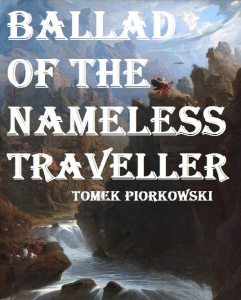
I studied quite a bit of Anglo Saxon poetry at school, and especially enjoyed the verse Beowulf, an alliterate poem lasting some 3000 odd long lines telling the tale of a monster slayer. There are also many other such poems in Turkish, and also Norse. I think it is fair to say the writer of this book has been greatly influenced by these.
The Nameless Traveler is an epic adventure book written in couplets; this is an ambitious piece. The thing is, the stories are good, in fact, excellent – so why has the writer taken it upon himself to force a rhyme onto each line? Poetry by rights, has rules. There are different ways that poetry should scan; rhythms that are naturally pleasing to a reader’s mind. Rhymes can be half rhymes, or half lines, but here many are not set. Which can also be fine, if there is a pattern to the non-rhyme. In alliterate verse, there should be four stresses. But here, sentences are forced into parts and put back together inside out to suffer a rhyme at the expense of the story. Often I felt the writer had searched rhyming dictionaries to crowbar in an obscure word, just so he can have the rhyme, but the word sometimes is not truly used in the right way. So in the end, instead of enjoying the substance, which is actually in part brilliant, I was groaning at style, as another either corny or medieval word sprung out at me, shoehorned into a backwards line. I couldn’t settle my mind to the pace, and often found myself having to restructure sentences just to follow the story, even with the somewhat befuddling footnotes to explain words (I wasn’t confused by words’ meanings: I was confused by their usage).
Maybe someone not such a stickler for verse reading well in pace will forgive this, but the whole point of this book is clearly the fact the writer wrote it in verse at all, which in a way, is a shame. Had this book been written in normal prose, it would have been a real hit for me because there is much to admire. It is an intricate project completed, and an interesting and original imagined world does stand out.
If verse and fantasy epics are for you, this will whet the appetite, especially for Game Of Thrones fans, and there is more than a hint of Cloud Atlas to the timeless traveler’s journeys, with vampires and werewolves to be slain and princesses to be saved in every kingdom – on his quest to stop the awakening of an uber-demon, Uzoom. As a performance piece this book could really find its voice in ways that are just not possible on the page, and I do imagine ultimately that it may find a place there and be something of a success if it is so interpreted, and the fact this book is so quaint in its conception will appeal to readers who, like me, love to find the eccentric and different in the wild soaks of the self-published.
Links
Get an Editorial Review | Get Amazon Sales & Reviews | Get Edited | Get Beta Readers | Enter the SPR Book Awards | Other Marketing Services






















Hi Catherine, thanks for the thorough review!